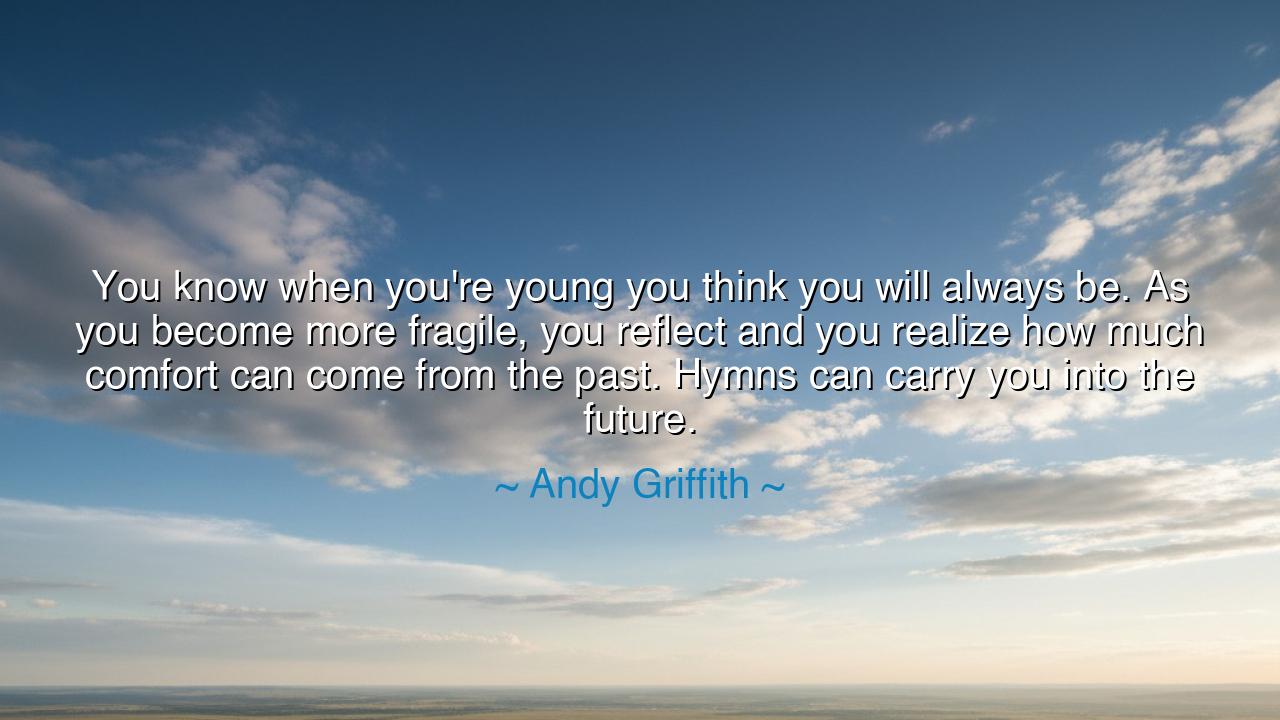
You know when you're young you think you will always be. As you
You know when you're young you think you will always be. As you become more fragile, you reflect and you realize how much comfort can come from the past. Hymns can carry you into the future.






"You know when you're young you think you will always be. As you become more fragile, you reflect and you realize how much comfort can come from the past. Hymns can carry you into the future." These thoughtful words from Andy Griffith speak to the fragility of life, the inevitable passage of time, and the comfort that can be found in the memories and traditions of the past. When we are young, we often feel invincible, as though we will remain forever unchanged, forever strong. However, as we age, we are confronted with the inevitability of our vulnerability, and in these moments of reflection, we seek comfort in the past—particularly in the things that have always given us peace and strength, such as hymns, songs, or even rituals that ground us.
In the ancient world, the passage of time was often seen as a force that could not be escaped. The Greeks viewed life as a series of cycles, and their works, particularly Homer's Iliad and Odyssey, emphasized the tension between the youthful vigor of heroes and the inevitable decline that comes with age. Achilles, for example, embodies the untouchable strength of youth, yet even he faces the reality of death and fragility. Nestor, the wise old king in the Iliad, often speaks of the lessons he has learned through the passage of time, and his reflections on aging highlight how the wisdom of experience becomes a source of strength when physical prowess fades. In the same way, Griffith’s reflection on aging and the comfort of the past speaks to the ancient understanding that youth and strength are fleeting, but wisdom and comfort grow from the reflection on the past.
Consider the Romans and their reverence for their ancestors. The tradition of honoring the familial past was deeply embedded in Roman life. They believed in the concept of "mos maiorum", the customs of the ancestors, which guided their actions and decisions. The Romans held their ancestors in high esteem, seeing them as guardians of wisdom and guides for the future. In the same way, Griffith speaks of how the past, particularly in the form of hymns, can provide strength and comfort as we face the future. The ancient wisdom of the past, whether through family stories or religious traditions, was often relied upon to guide people through difficult times, much like the hymns Griffith mentions that help carry us forward when we feel fragile.
The importance of tradition in providing comfort can be seen in the story of King Solomon, the biblical king known for his wisdom. Solomon, though young and capable, was often faced with the weight of leadership and responsibility. In moments of uncertainty, he sought guidance from the traditions and wisdom passed down from his father, David, and from the religious teachings of his ancestors. Solomon's prayers and hymns to God were a source of strength during times of trial, showing that even the greatest leaders sought the comfort of tradition and reflection to guide them through uncertain times. His story reinforces Griffith’s point that the past, when embraced and reflected upon, can offer invaluable comfort and direction, especially as we grow older and face the limitations of our physical selves.
In modern life, the idea of finding comfort in the past is often overlooked as we are drawn into the fast-paced, future-driven mindset of progress and innovation. However, as Andy Griffith wisely notes, the past, especially through things like hymns and songs, can be a nurturing force that connects us to something greater than ourselves. Music, especially hymns, has a timeless power to evoke memories and emotions, offering a deep sense of solace when the world feels overwhelming. The comfort found in these traditions is not about living in the past but about drawing strength from it to move forward with purpose. This idea is reflected in the modern world by people who seek solace in heritage, religious practices, and family traditions during times of loss or change. These practices, like hymns, become the vessel through which one can navigate life’s challenges with grace and resilience.
The lesson we can draw from Griffith’s reflection is that as we move through life, especially as we grow older, we must not forget the power of the past to nurture and guide us. While youth may be filled with ambition and energy, it is in our later years, when we are faced with the fragility of life, that we truly learn the value of reflection and tradition. The wisdom of the past, passed down through stories, songs, and rituals, is a gift that can help us carry forward into the future with strength. Whether through family history, spiritual practices, or cultural heritage, these are the anchors that can offer us comfort in the face of uncertainty.
In practical terms, this means taking time to reflect on the lessons of the past, seeking strength in our traditions, and finding ways to connect with what has shaped us. As we look to the future, let us remember that our roots in the past can give us the nurturing strength to move forward with courage and peace. Whether through prayer, song, or simple reflection on our shared history, we can find the comfort we need to embrace what lies ahead. Let us not neglect the wisdom of the past, for in it lies the foundation upon which we can build a future full of hope and resilience.






AAdministratorAdministrator
Welcome, honored guests. Please leave a comment, we will respond soon